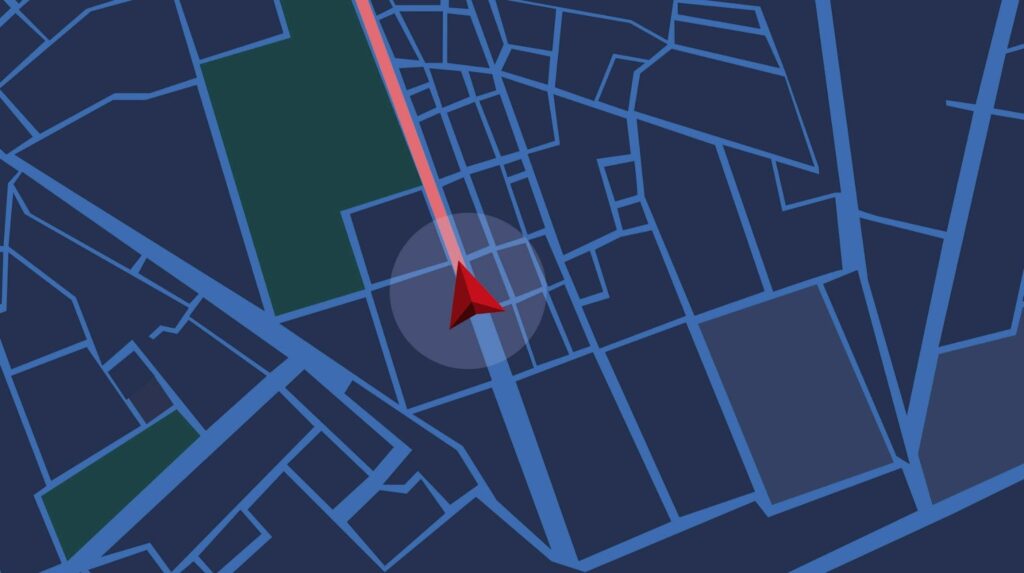The best thing about maps is that they not only tell you where you are, but help you get where you want to go. The next time you get lost, you’d be lucky to have someone like Doug Daniels around. Doug recently joined SADA as Director of Location Intelligence, which means he’s a Google Maps pro. When SADA was recently recognized by Google as a Specialization Partner of the Year for Location-Based Services, attention turned again to the innovative ways businesses are incorporating maps and other geolocation solutions into their apps and platforms. Doug has seen a lot of changes in geolocation technology over the years and is currently bringing his perspective to customer engagements in a variety of industries, exploring such topics as how AI will influence the world of maps. We’re happy to have Doug on board to help show us the way.

Geeking out on maps with Doug Daniels, SADA Director, Location Intelligence
What led you to become involved in the world of maps, geolocation, and other ways to avoid getting lost?
My career journey in mapping started in graduate school. I wrote my thesis on the need for wireless E911 location systems and the need to identify the location of callers during emergencies.
After graduation, I was fortunate enough to end up working for one of the leaders who provided a location-based solution to wireless carriers to solve this problem. Over the next several jobs, my passion for location-based services continued to evolve, including working for a company that provided software for asset tracking and mobile navigation.

My involvement with Google Maps actually started in the early 2000s when I worked for a company that provided the underlying spatial platform software to companies like Yahoo and their Yahoo Maps service, which was the biggest internet mapping company besides MapQuest at that time.
Google was just an up and coming search company, but they knew they needed mapping capabilities for local search. I ended up being responsible for the licensing of their spatial software and mapping data to Google in 2004, which then launched Google Maps in 2005 and Maps API in 2006.
Fast forward, it’s awesome to be able to say I was part of the launch team that worked with Google to realize what would eventually become the largest internet mapping provider in the world. I would come back to work for Google in 2012, running the GTM team for Google Maps, and that was my first introduction to the SADA team. It’s been nothing short of an amazing journey and now coming full circle to work at SADA to continue to take the business to the next level is exciting for what the future holds with the intersection of mapping technology and AI.
Walk us through how Google Maps has evolved since it launched.

In the late 2000s, Google Maps evolved in several key areas, including coverage, content, and capabilities. While expanding worldwide coverage was top of mind for Google, adding new visualization capabilities, such as being the first to offer satellite imagery, helped differentiate the service.
The content and capabilities continue to evolve, and now include higher-resolution imagery, traffic coverage, and extensive points of interest. Today, Google has the most comprehensive coverage and content among internet mapping providers, evidenced by over 1 billion active web users and 1.8 billion mobile app users.
Google Maps continues to enhance the user experience with even richer features, including 3D imagery, highly localized Places content, and real-time traffic data, to name a few. These advancements make everyone’s daily life that much more informed.
What are some surprising features of Google Maps that you think more people need to know about?

The recent announcement at Google I/O showcasing 3D immersive imagery is really cool and compelling to our customers in the hospitality industry as well as retail. Being able to visualize a report property like the location of the pool, golf course, or convention center really helps the end-user experience the property before they even arrive.
How do you anticipate location-based services and AI blending in the future? What’s the crossover?
The ability to use natural language to ask for a complex map would be really helpful for businesses that don’t have the necessary GIS functions in-house.
For example, a realtor might ask, “Show me a map of this area that includes all recently sold homes that are on lots bigger than half acre, are within 10 min of biking trails, and have mature landscaping…” Today, that person would need to have access to several databases that contain this information and be able to perform various spatial queries like distance to trail network, an ability to determine via imagery what mature landscaping looks like, lot size, etc. AI is pointing to a really cool future for maps. Such applications used to represent very complex work with a GIS platform like ESRI.
SADA was awarded Google Cloud’s 2024 Specialization Partner of the Year Award for Location-Based Services. What led SADA to earn this designation?
It was a great honor to receive an award for Specialization Partner of the Year for Location-Based Services. It showcases our commitment and experience to the Google Maps ecosystem over the last 12+ years. Having 700+ customers with 1200+ projects using Google Maps API speaks to our experience in helping organizations integrate Google Maps into their own web and mobile applications.
Maps are used in lots of different industries. Retail, manufacturing, anything involving supply chain management. But what are some industries that we wouldn’t necessarily think of as having a use for maps that are innovating in this space?
One recent use case is how routing and navigation are being used to help schedule home health clinicians to their appointments for the day.

One major healthcare company in particular is working closely with SADA to help optimize these visits across the U.S., making sure the right healthcare provider arrives at the right time, and doing that across thousands of healthcare resources. This example showcases what is possible when you fuse location intelligence, routing, and navigation in the schedule and visit process.
What can a customer expect when they engage with SADA for location-based services?
Customers should expect they are working with a partner that has over a decade of Google Maps experience and understands how to deliver a solution that leverages best-in-class mapping technology from Google. SADA understands how to successfully build applications, from simple store finders to complex on-demand delivery solutions and deliver it within budget and on time.
An overview of SADA location-based services
Google Maps puts the power to navigate the entire planet in the palm of your hand. SADA helps businesses Integrate groundbreaking location intelligence capabilities into mobile apps, supply chain applications, and customer-facing platforms.
Today’s customers are fully mobile and expect real-time updates on shipments and deliveries. They want more from maps than the names of streets and major landmarks. They’re adept at finding alternate routes and avoiding obstacles and delays when getting from point A to B. SADA’s team of location-based intelligence experts help you meet them where they are and take them where they wish to go.
Meet your go-to location intelligence guides

When you work with SADA experts to integrate Google’s location-based services into your unique business offerings, you get access to leading authorities on geolocation, routing, and integrating maps into customer-facing apps. Every engagement starts with a deep dive into your unique business opportunities and outcomes and includes:
- Custom project roadmaps, with clearly defined milestones for both business and technical stakeholders
- Training sessions and resources tailored specifically for your team
- Ongoing support services designed to troubleshoot, refine, and identify opportunities post-deployment
Access to best practices developed by a deep bench of Google Maps experts with a track record of successful projects across multiple industries. Location technology can include such diverse practices as proximity-based marketing, roadside assistance, locating stolen assets, and real-time traffic updates.
Location services empower users with mobile devices to locate restaurants and access travel information. SADA experts provide services based on your organization’s particular needs for location data as well as your unique opportunities and regulatory environment.
Of course, location-based solutions are just one component of an organization’s full tech stack. SADA also provides access to a deep bench of expertise on cloud security, productivity & collaboration, generative AI, and infrastructure modernization to complement the location intelligence initiative you’re developing.
When location-based apps include credit card transaction features, reveal a customer’s location, or maintain a location history, cloud security concerns are of paramount concern. Fraud prevention, data protection, and services that protect a mobile caller’s location are just a few of the items businesses must consider when comparing existing solutions to a bespoke location-based service.
Put your business on the map with SADA location-based services
Reach out today to schedule a discovery call with SADA experts who’ll help you integrate the power of Google Maps into your unique solution.




